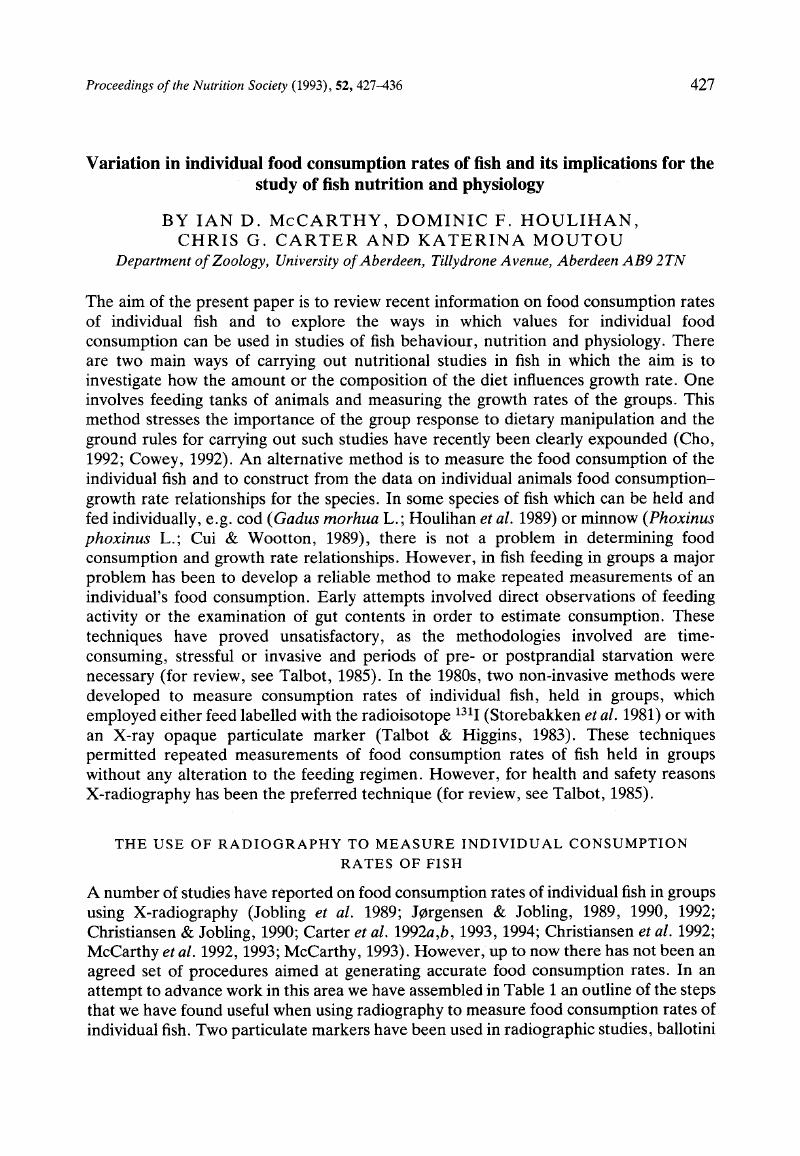Crossref Citations
This article has been cited by the following publications. This list is generated based on data provided by Crossref.
Carter, C. G.
Houlihan, D. F.
Buchanan, B.
and
Mitchell, A. I.
1993.
Protein-nitrogen flux and protein growth efficiency of individual Atlantic salmon (Salmo salar L.).
Fish Physiology and Biochemistry,
Vol. 12,
Issue. 4,
p.
305.
1994.
Individual variation in protein turnover and growth efficiency in rainbow trout,
Oncorhynchus mykiss
(Walbaum)
.
Proceedings of the Royal Society of London. Series B: Biological Sciences,
Vol. 257,
Issue. 1349,
p.
141.
Carter, C. G.
McCarthy, I. D.
Houlihan, D. F.
Fonseca, M.
Perera, W. M. K.
and
Sillah, A. B. S.
1995.
The application of radiography to the study of fish nutrition.
Journal of Applied Ichthyology,
Vol. 11,
Issue. 3-4,
p.
231.
Perera, W. M. K.
Carter, C. G.
and
Houlihan, D. F.
1995.
Feed consumption, growth and growth efficiency of rainbow trout (Oncorhynchus mykiss(Walbaum)) fed on diets containing a bacterial single-cell protein.
British Journal of Nutrition,
Vol. 73,
Issue. 4,
p.
591.
TUENE, S.
and
NORTVEDT, R.
1995.
Feed intake, growth and feed conversion efficiency of Atlantic halibut, Hippoglossus hippoglossus (L.).
Aquaculture Nutrition,
Vol. 1,
Issue. 1,
p.
27.
Carter, C. G.
He, Z-Y.
Houlihan, D. F.
McCarthy, I. D.
and
Davidson, I.
1995.
Effect of feeding on the tissue free amino acid concentrations in rainbow trout (Oncorhynchus mykiss Walbaum).
Fish Physiology and Biochemistry,
Vol. 14,
Issue. 2,
p.
153.
JOBLING, M.
ARNESEN, A.M.
BAARDVIK, B.M.
CHRISTIANSEN, J.S.
and
JØRGENSEN, E.H.
1995.
Monitoring feeding behaviour and food intake: methods and applications.
Aquaculture Nutrition,
Vol. 1,
Issue. 3,
p.
131.
Houlihan, D.F.
Carter, C.G.
and
McCarthy, I.D.
1995.
Metabolic biochemistry.
Vol. 4,
Issue. ,
p.
191.
Carter, C.G.
Purser, G.J.
Houlihan, D.F.
and
Thomas, P.
1996.
The Effect of Decreased Ration on Feeding Hierarchies in Groups of Greenback Flounder (Rhombosolea Tapirina: Teleostei).
Journal of the Marine Biological Association of the United Kingdom,
Vol. 76,
Issue. 2,
p.
505.
Stead, S M
Houlihan, D F
McLay, H A
and
Johnstone, R
1996.
Effect of ration and seawater transfer on food consumption and growth of Atlantic salmon (Salmo salar) smolts.
Canadian Journal of Fisheries and Aquatic Sciences,
Vol. 53,
Issue. 5,
p.
1030.
McCarthy, I. D.
Carter, C. G.
Houlihan, D. F.
Johnstone, R.
and
Mitchell, A. I.
1996.
The performance of all‐female diploid and triploid Atlantic salmon smolts on transfer together to sea water.
Journal of Fish Biology,
Vol. 48,
Issue. 3,
p.
545.
Madrid, J.A.
Azzaydi, M.
Zamora, S.
and
ánchez-Vázquez, F.J.
1997.
Continuous Recording of Uneaten Food Pellets and Demand-Feeding Activity.
Physiology & Behavior,
Vol. 62,
Issue. 4,
p.
689.
Damsgård, B.
Arnesen, A. M.
Baardvik, B. M.
and
Jobling, M.
1997.
State‐dependent feed acquisition among two strains of hatchery‐reared Arctic charr.
Journal of Fish Biology,
Vol. 50,
Issue. 4,
p.
859.
Wathne, Einar
Bjerkeng, Bjørn
Storebakken, Trond
Vassvik, Vidar
and
Odland, Anne Brit
1998.
Pigmentation of Atlantic salmon (Salmo salar) fed astaxanthin in all meals or in alternating meals.
Aquaculture,
Vol. 159,
Issue. 3-4,
p.
217.
Ruohonen, Kari
1998.
Individual measurements and nested designs in aquaculture experiments: a simulation study.
Aquaculture,
Vol. 165,
Issue. 1-2,
p.
149.
Gélineau, A
Corraze, G
and
Boujard, T
1998.
Effects of restricted ration, time-restricted access and reward level on voluntary food intake, growth and growth heterogeneity of rainbow trout (Oncorhynchus mykiss) fed on demand with self-feeders.
Aquaculture,
Vol. 167,
Issue. 3-4,
p.
247.
Fraser, K P P
Lyndon, A R
and
Houlihan, D F
1998.
Protein synthesis and growth in juvenile Atlantic halibut,Hippoglossus hippoglossus(L.): application of15N stable isotope tracer.
Aquaculture Research,
Vol. 29,
Issue. 4,
p.
289.
Ali, M.
Przybylski, M.
and
Wootton, R. J.
1998.
Do random fluctuations in daily ration affect the growth rate of juvenile three‐spined sticklebacks?.
Journal of Fish Biology,
Vol. 52,
Issue. 2,
p.
223.
Shelverton, P.A.
and
Carter, C.G.
1998.
The Effect of Ration on Behaviour, Food Consumption and Growth in Juvenile Greenback Flounder (Rhombosolea Tapirina: Teleostei).
Journal of the Marine Biological Association of the United Kingdom,
Vol. 78,
Issue. 4,
p.
1307.
Carter, C. G.
Houlihan, D. F.
and
Owen, S. F.
1998.
Protein synthesis, nitrogen excretion and long‐term growth of juvenile Pleuronectes flesus.
Journal of Fish Biology,
Vol. 53,
Issue. 2,
p.
272.



